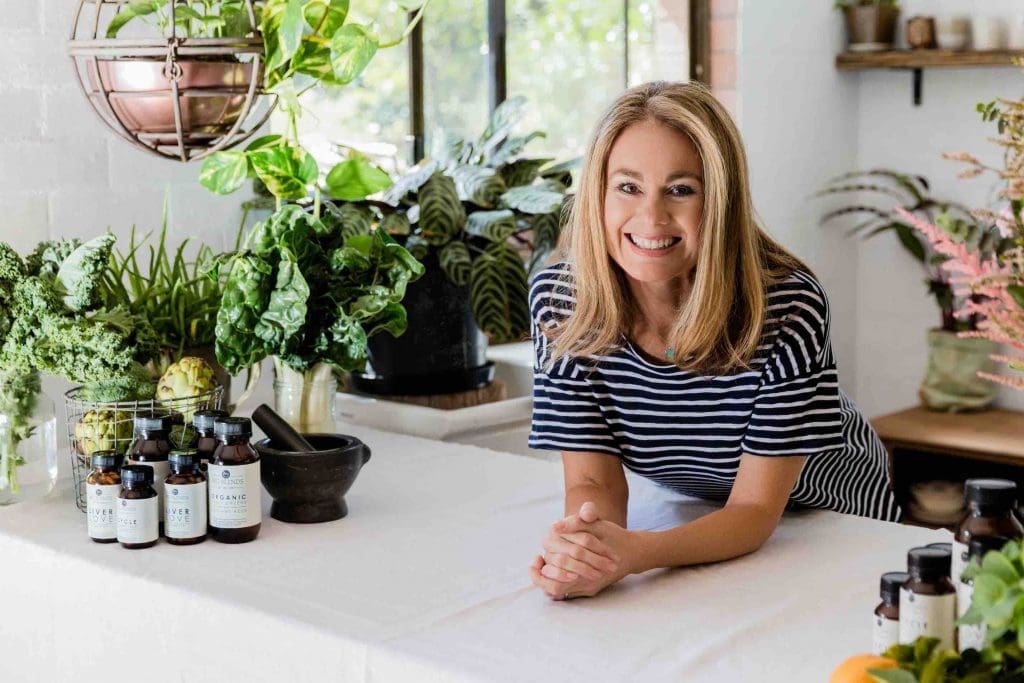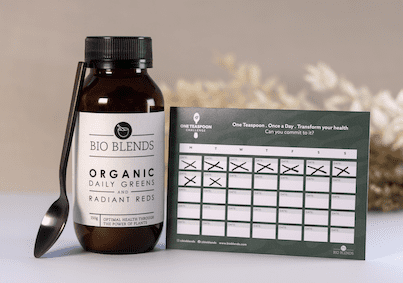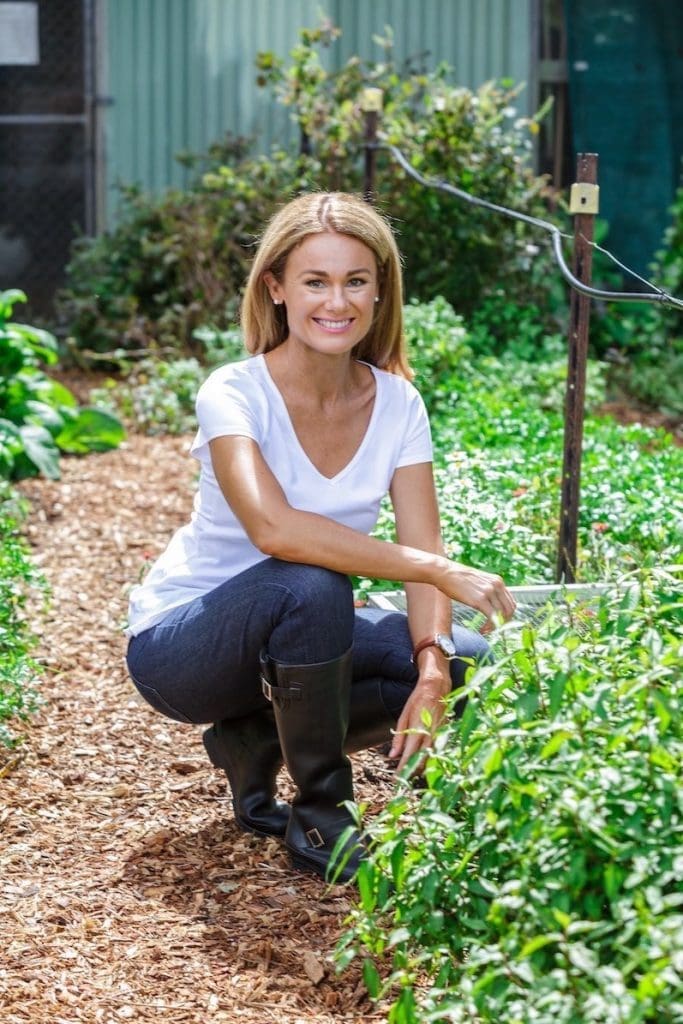Feeling a bit blah? Succumbing to some winter chills and ails? Finding it a bit tough to drag yourself out of bed at the moment?
You’re not alone – and, after the 18-months we’ve all just been through, it’s hardly surprising that so many of us are feeling like we’re pouring from an empty cup right now.
When it comes to wellness – particularly women’s health – I’ve lost track of the number of times I’ve heard people sing the praises of Dr Libby Weaver. I’ve actually heard it most from journalist friends and colleagues, returning to the office after an interview absolutely raving about the woman, as though they’d had an evangelical experience*. And so, while I’m feeling like my health and energy levels could definitely be in a better place (which I’m also hearing a lot of you sympathising with at the moment!), I figured, what better time to finally lock in a chat with the health guru herself.
Dr Libby, who I’m speaking to from her office in Burleigh Heads, has – like everyone else on the planet – had an intense last 12 months. And as someone who has literally written the book on the effect of stress on women’s bodies, she’s had us all keenly in her thoughts during this time. For those who are less familiar with Dr Libby, she’s a thirteen-times best-selling author (you’ll likely have heard of Rushing Woman’s Syndrome, The Invisible Load and Women’s Wellness Wisdom), a respected international speaker (having shared the stage with the likes of Sir Richard Branson, Tony Robbins and Marianne Williamson), and is the founder of food-based supplement range, Bio Blends.
She has an extensive and intimate knowledge on the effects of stress on our bodies (and is sharing her wonderful expertise and tips for how to combat it in an upcoming conversation – keep an eye out for that story coming soon!) and is absolutely passionate about nutrition, which plays such a key role in our overall health. The right diet can make the world of difference, from boosting our energy levels, to supporting our immune function, to helping combat the negative effect of stress on our bodies. And it turns out, for most of us, there is a lot of room for improvement.
“Unfortunately, the statistics are really dreadful,” tells Libby. “The latest Ministry of Health stats is that only about 53% of New Zealand adults eat enough vegetables. And, I know, it seems like such a boring topic, to be talking about vegetables, but it’s just one of the most basic fundamental ways we look after ourselves”
What’s more, she says, those recommendations for the minimum amount of veges we should be consuming is just for average, basic health. “It’s not for kick-it-out-of-the-park health, or increased energy levels,” she adds.

The Magic of Broccoli and Getting 5+ EVERY Day
Yes, getting in those five plus a day is vital for getting essential vitamins and mineral content to keep so many of our vital functions ticking along, says Libby. But that’s not where it stops.
“They’ve got certain substances in them called phytochemicals, that are active substances that actually drive some of the biochemical pathways inside of us,” she says.
Some of the things we can find in vegetables – such as phytochemicals – are hugely powerful, making our body run efficiently on a day-to-day basis, but they are also highly protective against disease and degeneration.
Take broccoli, for instance. “So, broccoli – and the entire brassica family – they’ve got a huge range of different phytochemicals and one of them, when we eat the broccoli, our body converts one of the things in it, into a thing called sulforaphane. And that has been shown in a number of different research piece to be very good for liver detoxification and highly protective against estrogen sensitive breast cancers.”
So How Do We Do It?
For the next month, Dr Libby wants us to focus on incorporating more vegetables into our meals – preferably getting them into each main meal of the day. It takes a bit of discipline, but it means moving away from just thinking of veges as something that is a side dish, and instead making them a key element.
So, what might that look like? “Take brekkie – maybe you’re thinking of an omelet,” says Libby. “Well, maybe you could throw in some spring onion, spinach, capsicum and tomato into it! At lunch, instead of just putting a piece of lettuce into your sandwich, pack it with tomato, carrot or beetroot – or, make a casserole or soup from your leftover veges!”
To help Kiwis ensure they’re getting what they need, she has formulated a Bio Blends supplement, called Daily Greens and Radiant Reds which is a concentrated dose of five different vegetables and blackcurrants to give people a boost in. those nutrient dense plants and vegetables.
She’s challenging Kiwis to take a dose every day as part of the One Teaspoon challenge – starting May 31 – and to spend the month thinking about our vege intake.


But I Take a Multivitamin! I’m Fine… Right??
The problem with relying on a supplement to get your daily intake of minerals and vitamins is that unfortunately, they’re designed to be just that – a supplement to a healthy diet. Nothing beats whole foods for getting your daily requirements, and a supplement alone isn’t going to get you there.
“Most supplements – not all, but most – are made synthetically in the laboratory,” says Libby. “That’s not a put down, but they’re there to supplement an already pretty good way of eating. But unfortunately, a lot of people think, well, if I’m taking that then I can eat in a more poor-quality way because I’m covering my bases with a supplement.”
The problem with that is that you’re missing out on those protective and unique substances that you’ll only find in whole foods – and, more often in organic varieties.
What’s So Great About Organic?
Yes, it’s often harder to come across – and significantly more expensive – but, as Dr Libby explains, there is a big difference in what you’re getting. And it doesn’t have to be ridiculously expensive – you can often pick up spray-free or organic vegetables from your local farmer’s market or roadside stall – or, plot your own little vege garden.
Where you can see some of the biggest difference is they contain some of those unique substances you won’t find in sprayed varieties.
Take flavonoids, for example. “I think a lot of people will have heard that term and perhaps know that it is an antioxidant,” tells Libby. “They’re often found in a wide range of fruits and vegetables – particularly the orange coloured ones. But, there’s something those fruits and vegetables need to be able to do in order to create those flavonoids, and that’s protect themselves. Plants do that as a defensive mechanism to defend themselves from pests if there is the potential for an attack, or an actual infestation.”
So, when they sense danger, that’s when they actually create those flavonoid substances which we can then eat and get the benefit of.
“But, unfortunately when we spray our fruits and veges, those natural defence mechanisms don’t need to be switched on because the sprays that coat the outside do that defence work and the plants don’t turn on the flavonoids.”


What Should I Be Eating To Get Through Winter, Avoid Getting Sick and Boost My Energy?
As we hit the colder months and immunity really becomes a focus, now is the time to really be looking at our diet. For a greater, stronger immunity Dr Libby suggests we focus on getting a good amount of Vitamin C, Vitamin D and Zinc
“For Vitamin C you’re looking at your citrus fruits, kiwi fruits and also your lightly cooked vegetables. If you boil your broccoli to death, there won’t be any left in it, but if you have it stir-fried, you’ll still get plenty of Vitamin C.”
And as for D? “We mostly get that from sunshine and it’s only in tiny, tiny amounts in our food now unfortunately. So, getting outside and getting safe sun exposure on a daily basis is incredibly important for our immunity.”
And sadly, zinc is now harder to find in our foods – largely due to the deterioration of nutrients in our soils. “We used to get it in lots of fruits, veges, bread and cereals, but now we really only get it in oysters, red meat, eggs and sunflower and pumpkin seeds.”
What About All the Trends Out There – Collagen? Paleo Diets? Should We Be Eating Kimchi? Is Kelp the New Kale?
Just a scroll through Instagram is enough to confuse the heck out of us all now, about what we should actually be eating. So how do we spot the difference between something that’s a fad, and something that is actually good, sound advice?
“Well, when it comes to nutrition, it’s important to remember that it moves in 30-year cycles,” says Libby. “Not everyone is going to be old enough to remember that, but when I was at uni, it was the low-fat era, and then it rolled around to the high protein era – that was nothing new, because the Atkins Diet was around in the 70s, but then, on schedule it rolled around in the late 90s/early 2000s!”
One moment carbs are our worst enemy, the next they’re our friend – and likewise fat, protein and any other number of food groups! “That can be incredibly confusing,” agrees Dr Libby. “So, my ultimate message is to remember that nature gets it right, and it’s essentially human intervention that can get it really wrong. When we eat mostly – not 100% – but mostly whole foods, you can’t really go wrong. Sure, there will be people who need some more specific information – say if they have digestive issues or arthritis – then you need more specific advice within that. But, as a general rule of thumb, when you eat whole, real food, it’s giving your body everything that it needs to run all the biochemical pathways inside of us.”
Join Dr Libby on the Bio Blends One Teaspoon Challenge by heading here!
*And yes, after this interview I did immediately call my workmates and tell them how AMAZING and knowledgable and incredible Dr Libby is.

